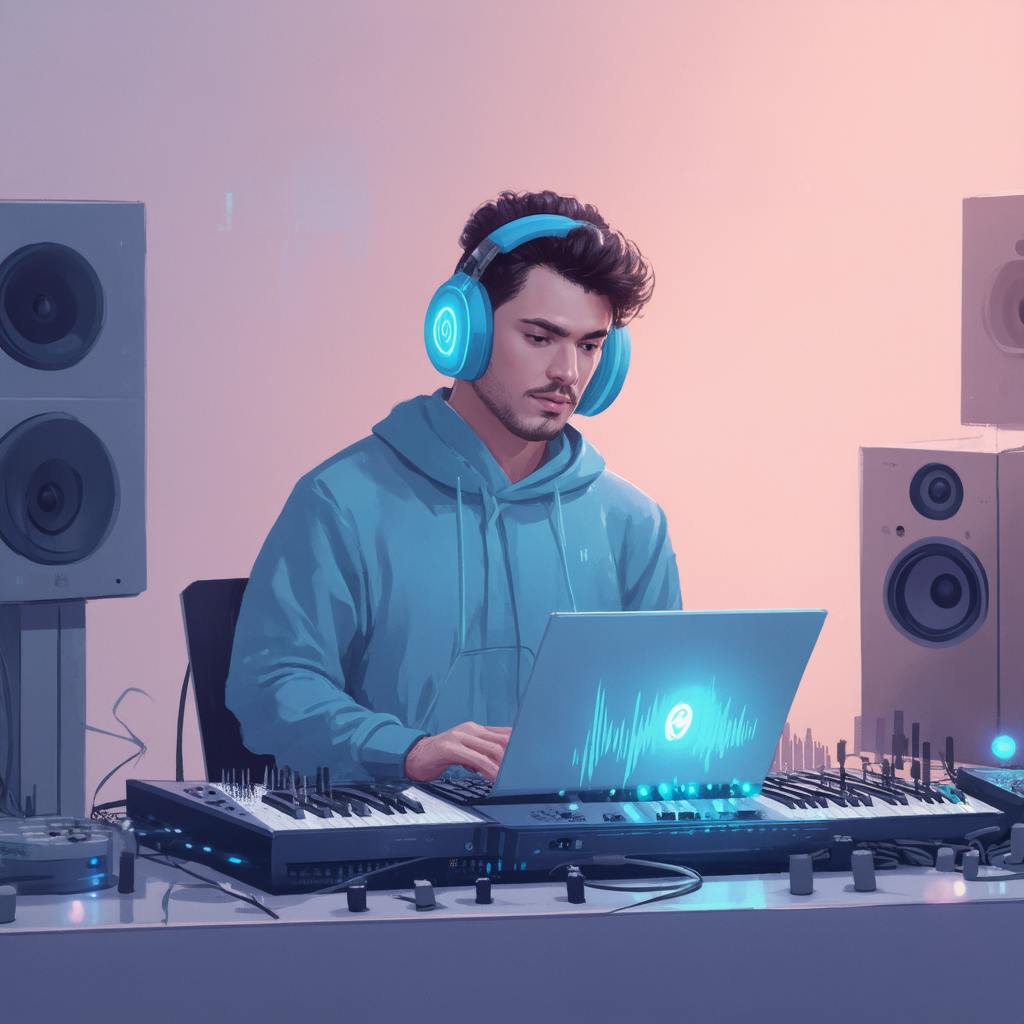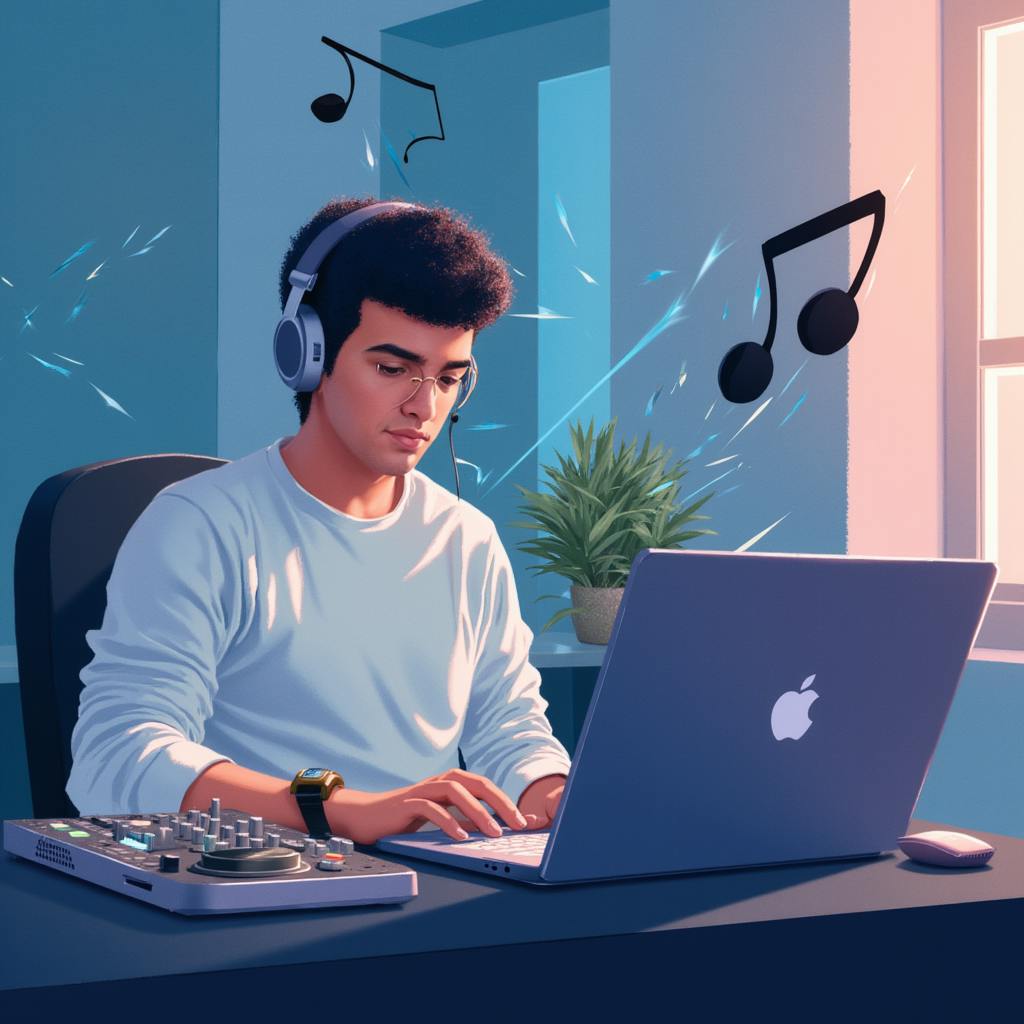The music industry is undergoing a monumental transformation, and at the heart of this revolution is Artificial Intelligence (AI). The benefits of AI in music are profound, ranging from streamlining music production processes to enhancing creative potential and offering unparalleled personalized experiences. With AI music composition, music production with AI, and AI for sound mixing, the landscape of music creation is evolving more rapidly than ever before. Let's explore the vibrant world of AI-empowered music and discover how these advancements are not only enriching the craft but also broadening its possibilities.
AI Music Composition: The New Age of Creativity
AI music composition is a groundbreaking development that allows musicians and composers to delve into new realms of creativity. AI-driven tools can generate original compositions by analyzing vast datasets of existing music, identifying patterns, and creating innovative melodies that resonate with listeners. This not only speeds up the composition process but also inspires human musicians by suggesting new musical directions they might not have considered otherwise.
Frequently Asked Question: Can AI replace human composers?
While AI can create music, it serves as a tool to complement, not replace, human creativity. AI compositions often act as a starting point or a source of inspiration, enabling human artists to refine and personalize the final work. The combination of human emotion and AI-generated innovation results in music that is fresher and more diverse.
Music Production with AI: Efficiency and Quality
AI has been a game-changer in music production, significantly improving both the efficiency and quality of production. By automating time-consuming tasks such as sound mixing, mastering, and even selecting track components, AI enables producers to focus more on the artistic aspects of music creation. AI for sound mixing ensures that tracks are blended seamlessly, often achieving superior audio quality than manual methods.

AI made with Dean Jones
Frequently Asked Question: How does AI assist in sound mixing?
AI algorithms analyze different audio qualities and use deep learning models to suggest or implement mixing options that ensure clarity and balance in a track. This not only enhances the auditory experience but also speeds up the production cycle, allowing musicians to release music more frequently.
Personalized Music Recommendations: Tailored Listening Experiences
Gone are the days of one-size-fits-all playlists. With AI, music lovers enjoy personalized music recommendations that cater to individual tastes. AI systems analyze listening habits, preferences, and even mood indicators to craft bespoke playlists that evolve with the listener's changing interests. This personalization enhances user engagement and ensures that listeners are constantly discovering new artists and songs.
Frequently Asked Question: How accurate are AI recommendations?
AI-powered recommendation engines are remarkably accurate due to sophisticated algorithms that constantly learn from usage patterns. The more an individual interacts with these platforms, the better they adapt to user preferences, thus enhancing the listening experience.
Enhancing Music Creativity with AI: Pushing Artistic Boundaries
One of the most compelling benefits of AI in music is its role in enhancing music creativity. By offering new tools for sound design and composition, AI challenges artists to step beyond traditional music-making boundaries. From creating entirely new instruments using AI-generated sounds to pushing the limits of genre through innovative compositions, AI is a powerful partner in artistic exploration.
Frequently Asked Question: Is AI creativity real creativity?
AI creativity reflects the synthesis of existing patterns rather than pure originality. However, when integrated into the human creative process, it enriches artistic outputs, sparking new ideas and leading to art that might not have been possible otherwise.
FAQ: The Benefits of AI in the Music Industry
As a Technology Analyst specializing in AI and the Music Industry, my aim is to provide clarity on how artificial intelligence is revolutionizing music. Let's explore the frequently asked questions on the benefits of AI in the music industry.
What are the main benefits of using AI in the music industry?
AI's integration into the music industry offers a range of benefits, enhancing efficiency, creativity, and business operations:
- Automation and Efficiency: AI automates tasks like music composition, sound mixing, and mastering, reducing time and human effort involved in production.
- Cost Reduction: By streamlining processes, AI allows artists and producers to cut down on production costs, making it accessible for various budget levels.
- Enhanced Creativity: AI tools assist musicians in exploring new sounds and genres, providing initial compositions that can inspire human creativity.
- Personalization: AI is used to analyze listener preferences and tailor music recommendations, playlists, and even bespoke compositions.
- Data-Driven Insights: AI helps in analyzing market trends, listener behavior, and streaming data, offering insights to artists and producers to better align their music with audience demand.
- Accessibility: With AI, music production becomes more accessible to non-musicians, allowing a broader range of individuals to participate in music creation.
How is AI transforming the way music is produced?
AI has fundamentally altered music production through various methods:
- AI Composers: Tools like OpenAI’s MuseNet or AIVA can generate complex compositions, offering a base template for musicians to refine and expand upon.
- Sound Mixing and Mastering: AI-powered algorithms can perform high-quality mixing and mastering faster than traditional methods, ensuring consistently high-quality audio.
- Virtual Instruments and Sound Design: AI enables the creation of new types of virtual instruments and sound textures that can produce innovative sounds not achievable with traditional instruments.
- Collaboration: AI facilitates collaboration by enabling artists to work on AI-generated tracks and enhance them collaboratively, transcending geographical barriers.

AI made with Dean Jones
What impact does AI have on music distribution?
AI is reshaping music distribution in several key aspects:
- Targeted Marketing: AI systems analyze user data to enable hyper-targeted marketing campaigns, optimizing promotion strategies and enhancing reach.
- Optimized Playlists and Recommendations: Streaming services employ AI algorithms to curate personalized playlists, improving listener satisfaction and engagement.
- Discoverability: AI enhances the discoverability of new music by recommending emerging artists to listeners who might be interested in specific genres or styles.
- Enhanced Analytics: AI provides detailed analytics on streaming data, helping record labels and artists to understand market trends and optimize their distribution strategies.
How is AI influencing creative decision-making in the music industry?
AI assists in creative decision-making by:
- Augmenting Creativity: While AI doesn't replace the instinct and emotion inherent in human creativity, it provides new tools and sounds that can inspire musicians to explore uncharted areas of creativity.
- Predictive Analytics: AI analyzes past successes and current market trends to predict future hits, guiding artists and producers in deciding what type of music to create.
- Audience Engagement: AI tools analyze fan feedback and interaction, offering artist insight into audience preferences and allowing better-informed creative choices.
- A/B Testing: AI enables the testing of multiple versions of a track for different audience segments, helping artists identify which version resonates best before a full-scale release.
Conclusion
The infusion of AI into the music industry is fostering unprecedented creativity, efficiency, and market understanding. From production and distribution to creative decision-making, AI’s involvement heralds a new era in music, pushing the boundaries of what we know about artistic creation. Whether you're an artist, producer, or music enthusiast, embracing AI’s capabilities can open new frontiers in every aspect of the music landscape.

